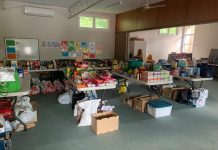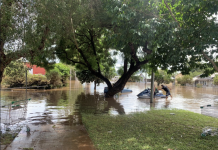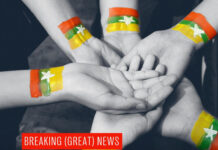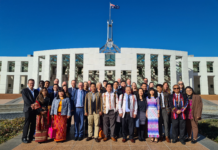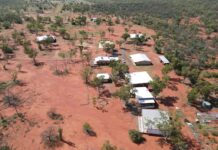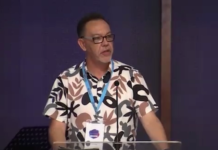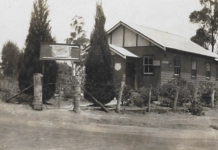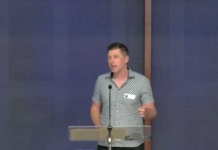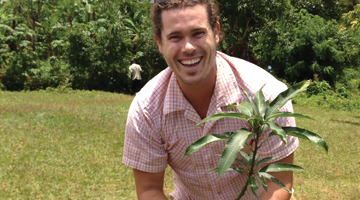
Disaster strikes. This is a phrase all too often splashed across the news headlines. From earthquakes, to volcanoes, floods, droughts, medical epidemics, and cyclones, no one knows when or where these disasters will strike next.
When they do strike, they have front page in newspapers, top headlines in news coverage and countless Facebook shares for a few days, before being lost to the back of the paper or news show, and within a week they have gone from the coverage completely. I don’t know about you, but I’m often left wondering, what’s next for these people whose livelihoods have been changed and destroyed by disaster? What is going on for them, weeks, months and ever years after the devastating event?
 This is where disaster management comes into the picture; it is not only there for the immediate response, but for the ongoing processes that need to happen in the rebuilding process. Disaster management also aims to educate areas that are at risk of natural disasters and health epidemics, and how to respond in an emergency situation. An article written in 2013 by Griffith University states that Australians are leading the way in advances in disaster management1. With the increase of disasters happening around the world, Baptist World Aid believes that these disasters have increased 7 fold in the last 50 years. In September, Baptist World Aid Australia released their Disaster Action Annual Report. The report highlights the importance Baptist World Aid puts on disaster management and the work many people are doing in this area, as well as the ongoing commitment to areas struck by disaster. These are some excerpts from their report:
This is where disaster management comes into the picture; it is not only there for the immediate response, but for the ongoing processes that need to happen in the rebuilding process. Disaster management also aims to educate areas that are at risk of natural disasters and health epidemics, and how to respond in an emergency situation. An article written in 2013 by Griffith University states that Australians are leading the way in advances in disaster management1. With the increase of disasters happening around the world, Baptist World Aid believes that these disasters have increased 7 fold in the last 50 years. In September, Baptist World Aid Australia released their Disaster Action Annual Report. The report highlights the importance Baptist World Aid puts on disaster management and the work many people are doing in this area, as well as the ongoing commitment to areas struck by disaster. These are some excerpts from their report:
“ Cyclone, flood, earthquake, drought, famine and war…
“ The number of natural and man-made disasters has increased 7 times in the last 50 years. Disaster management specialist Dan Skehan says various factors have led to the rise. “Over the last couple of years, global conflicts have played a part. In Syria, the number of people affected topped 4 million. That’s the biggest number of refugees for a single conflict in 25 years.
“ Climate change has also led to a higher incidence of droughts and floods and we can expect this to increase.
“ This means humanitarian organisations are really stretched. This is why helping communities to prepare for disaster is really important. It can lessen the impact and save lives.””
Dan Skehan, the Disaster Management Specialist for Baptist World Aid Australia, has given Together readers an insight into working in disaster areas, how he got involved in this work and how we can support the ongoing work his teams do.
Dan reflects that he has always been part of a strong Christian family, which has influenced and shaped his life to the point he is at today. It is through the start of his working life that the steps towards working at Baptist World Aid were formed. He explains, “My working life began in agriculture and farming in Queensland. This supplied the building blocks for a passion for rural community development, which led me to working for Baptist World Aid 6 years ago. A few years ago I moved into Disaster Management, helping to grow the organisation’s capacity to respond quickly and effectively around the globe.”
 How does a person get into Disaster Management? Dan shares what led him to the role, as well as the training required for such a task. “I originally got a glimpse of disaster management after working on projects during the Horn of Africa drought in 2011. I have a real interest in natural disaster events as well as climate change. Both are on the increase. I like working with communities to respond to those events and to build their resilience beforehand. Disaster management requires not only community development training, but also first aid expertise. I have done extensive training in First Aid, personal safety, and risk management so that I am as prepared as possible to be working in unstable and unsafe environments.”
How does a person get into Disaster Management? Dan shares what led him to the role, as well as the training required for such a task. “I originally got a glimpse of disaster management after working on projects during the Horn of Africa drought in 2011. I have a real interest in natural disaster events as well as climate change. Both are on the increase. I like working with communities to respond to those events and to build their resilience beforehand. Disaster management requires not only community development training, but also first aid expertise. I have done extensive training in First Aid, personal safety, and risk management so that I am as prepared as possible to be working in unstable and unsafe environments.”
Although disaster relief can be unsafe in the initial response, there are times when disaster relief can strengthen the faith of the workers and Dan himself. “In times of disasters I am humbled to walk alongside people whose lives have been damaged by earthquakes, cyclones, droughts and war. To see the poor, who are the most vulnerable to disasters, equipping themselves and their communities to become more resilient, and rebuild their lives, I am reminded of the Christian faith in which I put my hope. Working amongst poor communities in times of disaster has been a way to help bring God’s hope into this world” said Dan. The hope that Dan has spurs him on to continue in this line of work. Dan shares his favourite and encouraging bible passage which is Micah 6:8. “Giving voice to the voiceless is so important. In disaster this means making sure that the most vulnerable receive assistance as much as others in the community. Every child and person in the community deserves to be assisted in a disaster and assisting them to speak up and be counted is an awesome way we can act justly.”
In the face of disaster relief, helping those in need gives Dan a chance to share his faith with those around him, through word and deed. “Working in disaster relief and recovery I hold onto my faith strongly as a real source of hope. My faith in Jesus allows me to bring hope to people and communities that face natural and man-made disasters. By bringing my Christian hope into places of devastation, I believe it helps remind people that they are capable of rebuilding their lives.” Sharing the hope of Christ can be an encouragement in tough times, when all hope seems lost.
There are many challenges personally for Dan, such as being away from his family and friends for extended periods of time. Dan is continually open to what God is teaching him in the role he has been placed in for this season. Dan comments that “Through Joshua 1:9 and Matthew 25 I have been learning what it means to live with courage and to be good stewards of what we have been given by God. I trust that God has equipped me specifically to help those affected by disasters and to take courage to work in places that have been torn apart – places like Vanuatu and Syria.” Dan’s heart for the poor and vulnerable is clear to see in his line of work. He is able to identify the needs of the areas struck by disaster and help in practical ways. What is important for disaster relief is not only the on the ground help when the disaster strikes, but the longerterm focus of redevelopment in the area. The rebuilding process takes a long time for areas struck by disaster. It involves rebuilding livelihoods, economies and families, as well as support networks and partnerships. Establishing and helping with education and sustainability for the areas, before and after, disaster hits is something that can be established over time and relationships can be built.
 The fly in, fly out, approach to disaster relief is not helpful for communities in the rebuilding process after disaster. It is key for organisations to stay connected to the areas they have helped for follow up and ongoing assistance. Dan reinforces that Baptist World Aid is committed to this when asked about follow up opportunities. “Yes – a real part of our focus at Baptist World Aid is not only disaster response but also linking emergency response to recovery and then to long-term development. Our history in community development and focus on alleviating poverty means that building and sustaining long-term relationships with the participants of our programs is very important to us. As we walk alongside these communities I play an active part in staying connected to places where we have provided emergency relief and recovery. These days we are working to integrate disaster management into many areas of community development, for instance through community managed evacuation routes and emergency procedures.”
The fly in, fly out, approach to disaster relief is not helpful for communities in the rebuilding process after disaster. It is key for organisations to stay connected to the areas they have helped for follow up and ongoing assistance. Dan reinforces that Baptist World Aid is committed to this when asked about follow up opportunities. “Yes – a real part of our focus at Baptist World Aid is not only disaster response but also linking emergency response to recovery and then to long-term development. Our history in community development and focus on alleviating poverty means that building and sustaining long-term relationships with the participants of our programs is very important to us. As we walk alongside these communities I play an active part in staying connected to places where we have provided emergency relief and recovery. These days we are working to integrate disaster management into many areas of community development, for instance through community managed evacuation routes and emergency procedures.”
From our lounge rooms we watch as disasters unfold, as travel warnings are issued for disaster areas, and we sit feeling helpless in situations of disaster. There are many ways in which we can give ongoing support to the areas in need. One of these ways we can assist is to become an ongoing supporter of Baptist World Aid. Dan offers this regarding supporting and investing in Baptist World Aid: “As an organisation that’s over 50 years old, some of our initial days involved working with asylum seekers. For example, we helped refugees from World War II to resettle in Australia. We supported refugees from Burma in Thailand for over 15 years with basic health and education programs. When the Boxing Day tsunami hit, we responded with over $1 million of relief to those in Sri Lanka, Thailand and Indonesia. And many disasters that never made the news headlines were supported through Baptist World Aid with local partners giving real assistance to communities in need.
Today, we are connected to local partners who can respond straight after a disaster. They can deliver relief items very quickly, uphold Christian values in their distributions and treat people with respect. We want to see communities not only recover from disaster but also to continue to grow and develop after recovery activities have finished.”
A specific, direct way in which a person can show support of disaster relief is to give directly to the Disaster Action Fund. The fund is available for people to give to ongoing projects monthly, or with a single gift. Of the fund Dan explains, “Our Disaster Action Fund is the best way for people to contribute not only to disaster relief, but also the other phases of disaster management, including risk reduction and recovery. This significantly helps us to be ready to respond whenever a disaster strikes. Most recently, we have been able to respond to support the flood relief in Bangladesh, India, and Myanmar because we have dedicated supporters who know the value of preparedness.” Knowing that there are funds available for when disasters happen would be a comfort for those in need.
Another way people can support Baptist World Aid is through prayer. In praying for Baptist World Aid we can pray for the workers, the organisation and of course the areas that are affected by disaster. When asked about how Together readers can support Baptist World Aid in prayer Dan said “I think that many of us, me included, find it hard to remember the poor or vulnerable in our prayers, especially when their story is no longer covered by the media. But I think it’s then in particular that we are to remember the poor. They are often still physically, emotionally, psychologically, and spiritually impacted long after a disaster strikes. These people are our global neighbours and our prayerful support brings hope, transformation, and shows our trust in God. We can be praying always for countries like Nepal or Syria; that they will be able to rebuild, that they will find and hold onto hope, that their lives will be restored, that God will be at work, and that the most vulnerable (who are often children and women) will be protected and given a voice in the recovery of their nation.
Baptist World Aid believes in the power and role of prayer to address global poverty and social justice. We assist individuals and churches with prayer points to guide them through specific countries and issues.”
As news fades quickly of natural disasters for the media, the rebuilding process for those in disaster zones can take months and years. How can we be kept up to date with what is happening? “Baptist World Aid is working on ensuring that supporters of disasters are kept up to date with disaster responses. After the initial response period – up to 3 months – progress slows down and moves into recovery. We are working extensively to ensure that people who are interested in the long-term recovery of these communities are kept up to date,” says Dan. By producing the Disaster Action Annual Report, Baptist World Aid is keeping people up to date with what is happening around the disaster areas.
Baptist World Aid Australia is committed to moving forward in areas of disaster management. Dan shared this encouragement for people who are thinking of partnering with Baptist World Aid “We are always trying to improve how we assist those most in need as stewards of what God has given us. By partnering we can assist communities to be better prepared for disaster as well as rebuilding and linking to long-term recovery after an event.”
Please keep Baptist World Aid Australia in your prayers and specifically those who have been hit by disasters, and for the ongoing work of disaster relief.
To learn more, please visit www.baptistworldaid.org.au/disaster-action.

